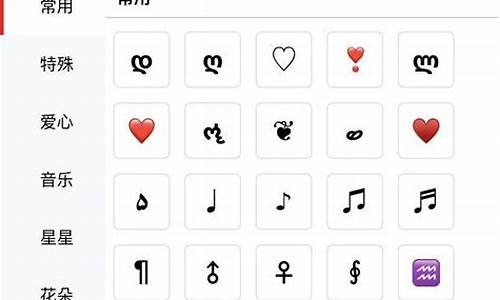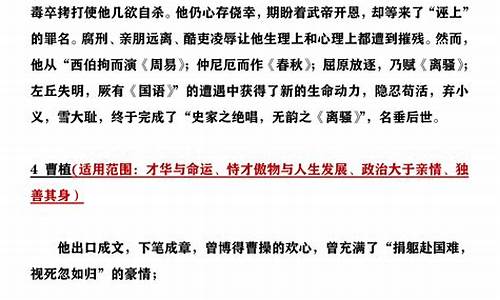您现在的位置是: 首页 > 经典语录 经典语录
英语答句可以省略东西吗_英语句子回答的省略是什么
tamoadmin 2024-09-21 人已围观
简介1.关于英语的省略这一块语法项目的问题2.英语的关于省略的问题3.英语语法省略详解4.英语的省略原则是什么?5.英语句子中什么时候可以省略 初中英语语法中的省略 一、并列复合句中某些相同成分的省略。 1. This beeper works well,but that one doesnt (work well). 这个寻呼机工作正常,但那个就
1.关于英语的省略这一块语法项目的问题
2.英语的关于省略的问题
3.英语语法省略详解
4.英语的省略原则是什么?
5.英语句子中什么时候可以省略

初中英语语法中的省略
一、并列复合句中某些相同成分的省略。
1. This beeper works well,but that one doesnt (work well).
这个寻呼机工作正常,但那个就不行。
2. All uranium atoms do not he the same atomic weight. Some of them weigh 234 units,some (of them) (weigh) 235 units,and some (of them) (weigh) 238 units.所有的铀原子并非都有相同的原子量。其中有的重234,有的重235,而有的重238。
二、在when,while,if,as if,though(或although),as,until,once,wheth er,unless,where等连词连接的状语从句中,常省略跟主句相同的主语和be动词。
1. When (water is) pure,water is a colorless liquid.
水纯净时,是无色的液体。
2. When (I am) in trouble I always turn to her for help.
我困难时总是找她帮助。
3. Errors,if any,should be corrected.
如果有什么错误,就应当改正。(if后省略了there are)
4. Wood gives much smoke while (wood is) burning.
木头燃烧时,它放出很多烟。
5. The letter is to be left here until (it is) called for.
这封信留在这里待领。
6. Henry looked about as if (he were) in search of something.
亨利向四周环视,似乎在寻找什么。
7. She studies very hard though (she is) still rather weak.
她尽管体弱,但学习仍十分努力。
三、当见到when (或if,where,wherever,whenever,as soon as,as fast a s,than等)+possible/necessary等时,可理解中间省略了it is(或was)。
1. Answer these questions,if (it is) possible without referring to the book.
如果有可能,请不看书回答这些问题。
2. When (it is) necessary you can help us to do something.
必要时你可以帮助我们做些事。
四、有形式主语it的主语从句可省略that。
1. It seems (或ears) (that) Joe is out,not Jack.
外出不在的似乎是乔,不是杰克。
2. It is an honor (that) I was invited to your birthday party.
我很荣幸被邀请参加你的生日聚会。
3. Its a pity (that) you cant operate a computer.
很遗憾,你不会操作计算机。
4. It is the third time (that) I he come to China.
这是我第三次来中国。
五、在限制性定语从句中可省略作宾语的关系代词whom,which,that。
1. That is the naughty boy (whom/that) we talked about last week.
那就是我们上周议论的淘气男孩。
六、在direction(方向),way(方式),distance(距离),time(时间),times(倍数)等后面所接的定语从句中常省略that,which,in which。
1. The direction (in which) we move a body can be changed.
我们移动物体的方向是可以改变的。
2. The distance (which或that) light trels in one second is 300,000 kilometers.
光每秒走的距离是30万公里。
七、以there be开头的`句子,其主语的定语从句常可省略关联词,而there be结构作定语从句时,省略作主语的关系代词。
1. There is a chance Dr. Li will be able to be back for May Day.
李博士也许有机会能回来过五一节。
2. We he to make a list of all the books there are on the subject. 我们必须把所有关于这个题目的书列出一个单子。
八、命令句、惊叹句、部分第一人称的陈述句、部分问句和答句中省略最为常见。
1. Open the door!开门!
2. Why not?为什么不?
3. Why so?为什么这样?
4. Anybody wishing to go?谁愿意去啊?
九、用so,not或其它手段来省略上文或问句中的一部分或整个句义,是NMET的常考项目。
1.—Can Emily do this work?
埃米莉能做这件工作吗?
—I think so.
我想她行。
—I think not (或I dont think so).
我想她不行。
2.—Did you know anything about it?
这件事你以前知道吗?
—Not until you told me.
你告诉了我,才知道。
3. He has gone. No one knowsswheres(he has gone).
他走了,谁也不知道他去什么地方了。
4. Jenny knows what (is to be done)!
詹妮有办法!
;关于英语的省略这一块语法项目的问题
英语省略用法是一种常见的语法现象,也是英语表达中简洁、高效的特点之一。在英语中,有些词语或句子在特定的语境下可以被省略,而不会影响句子的意思和理解。
对于英语省略用法的总结,个人认为有以下几点:
省略必须符合语境和语法规则。省略不是随意省略,而是要根据语境和语法规则进行省略。省略后的句子应该符合语法规则,不引起歧义,并且与上下文保持一致。
省略通常是为了简洁、高效地表达意思。在英语中,有时候使用过多的修饰词或冗长的句子会影响表达的清晰度和流畅度。通过省略一些不必要的词语或句子,可以使表达更加简洁、高效,便于读者理解。
省略不等于省略含义。有些词语或句子虽然被省略了,但是其含义并没有被省略。读者可以通过上下文、语境等理解被省略的含义,从而更好地理解句子的意思。
省略需要谨慎使用。虽然省略可以提高表达效率,但是过度使用省略会影响句子的可读性和易懂度。因此,在使用省略时需要谨慎考虑,确保省略不会影响句子的意思和理解。
总之,英语省略用法是一种常见的语法现象,通过合理使用省略可以提高表达效率,使句子更加简洁、流畅。但是需要注意,省略不能随意使用,必须符合语境和语法规则,并且不能影响句子的意思和理解。
英语的关于省略的问题
问题一:
I wonder why you won't do it as______.It's the third time you he done so.
这句话中间填的是 told to 。
这句话用的是状语从句的省略,当状语从句的主语与主句主语相同或者是it,并且后面是be动词时,可省略主语和be动词。常见的还有:please fill in the blanks where necessary. 省略的是it is
you can't speak unless asked. 省略 you are
后面的是不定式的省略,一般只保留to, 除非to后面是be 动词 或者原来是to he done,才会省略成to be /to he
问题二:
同问题一后一条,不定式的省略。
问题三:
不是所有的形容词都要三音节才用most 构成最高级的。这是一个例外。还有其他的。
英语语法省略详解
We will do all (that) we can (do) to help you.
1.定语从句中的省略
(1)在限制性定语从句中,作宾语的关系代词that, which, who (whom)常可以省略。如:
The man(who / whom) I saw is called Smith. 我见到的那个人名叫史密斯。
Where is the book (which) I bought this morning?今天上午我买的那本书在哪儿?
(2)关系副词when, where, why以及that在the time(day, morning, afternoon, evening, night, week, month, year等) when, the place(desk, table, room, spot, house, town, country, school等)where, the reason why, the way that结构中引导限制性定语从句时,在非正式场合下,可以省略关系副词when, where, why, that。如:
I shall never forget the day (when) we first met.
我永远也不会忘记我们第一次见面的那一天。
The reason (why) he came so early is his own affair. 他来这么早是他自己的事。
The way (that) you answered the questions was admirable. 你回答这些问题的方式令人钦佩。
2.动词不定式中动词原形部分是否省略,主要看句子前面是否已出现过同样的动词。如果句子前面出现过同样的动词,为了避免重复,句子后面的不定式常省略动词原形,而保留不定式符号to。如:They may go if they wish to(go). 如果他们想去,他们就可以去。
Don't go till I tell you to.直到我告诉你去,你才可以去。
在一些动词afford, agree, expect, forget, mean, pretend, remember, want, refuse, hope, wish, would like (love), try等后跟动词不定式作宾语,不定式中的to可以承前(后)省略。如:
-Will you go to the cinema with me? 你愿和我一起去看**吗?
-Well, I'd like to (go with you). 我愿意。
I would do it for you, but I don't know how to (do it for you).
我想为你做这事,但我又不知如何做。
英语的省略原则是什么?
英语语法省略详解
想要学好外语怎么能不知道英语中的省略呢?下面就让我为大家详解一下吧。
为了避免重复,句子,中某些部分常可省略。句子常可省略的有下列各部分:
1)省掉主语(多限于少数现成说法)
Thank you for your help.谢谢你的帮助。
See you tomorrow.明天见。
2)省掉谓语动词和表语等
a)省掉谓语动词
Some of us study Russian,others English.我们有的学俄语,有的学英语。(others后省掉study)
He got up earlier than I today.他今天起得比我早。(I后省掉got up)
On the right hand of Tian'anmen Square stands the Great Hall of the People,and on the left,the Museum of
Chinese history ***广场的右边是人民大会堂,左边是中国历史博物馆。
(On the left后省掉stands)
b)省掉连系动词
Ma Lin is a bus-driver,his wife a conductor.马林是女共汽车司机,他的妻子是售票员。(his wife后省掉is)
His face is tanned and his hands big and strong.他的脸晒得很黑,他的双手大而有力。(hands后省掉are)
Gold is more expensive than silver.金子比银子更贵重。(silver后省掉is)
She is as tall as I.她和我一般高。(I后省掉am)
Are you ready? -Yes,I am.你准备好了吗是,准备好了。(am后省掉ready)
3)同时省掉句子几个部分有时好几个句子成分都被省掉,特别在表示比较的状语从句中,在对疑问句的简略回答中,以及在反意疑
问句或选择疑问句中。如:
In winter it is colder in Beijing than in Guangzhou.北京的冬天比广州冷。(than后省略 it is)
She pledged herself to complete her father's unfinished task,whatever the cost.她立誓不管付出多大代价,也要完成
她父亲未完成的事业。(the cost之后省略主语和谓语动词it was)
When did you read the playLong age.(= I read it long ago.)你什么时候读的这个剧本很久以前。
He you ever been to xinjiang Never.(= I he never been there.)你到过新疆吗从来没有。
You are a repair worker,aren't you?(=aren't you a repair worker?)你是修理工,不是吗?
Has he gone or not?(= Has he gone or has he not gone?)他走了没有?
[注一]在if, when,though,as,as if(好像)等连词引导的'从句中,如果从句中的主要动词是be,可以将主语和动词be省掉。
如:When you do this exercise,make changes in the sentence structure when (if) necessary.做这个练习时,必要时可以改动
句子结构。(when或it之后省掉it is)
He is very good at painting,though very young.(= though he is very young)他虽然年纪很轻,但很会画画。
The boy looked as if afraid of nothing?( = as if he were afraid of nothing)那男孩看来好像什么都不怕。
上述例句中的省略从句,除if (when) necessary等成语外,其主语均须和主句的主语相同。
[注二]在下面的句子中,动词不定式符号to的后面省去了动词原形及其以后的部分。如:
You may go with them if you want to.你愿意的话,也可以和他们一起去。(to后省去go with them)
Will you be able to come? -I'd love to. But I'm busy.你来吗我倒很想来,可是我现在有事。(to后省去come)
;英语句子中什么时候可以省略
这道题应该是 过去分词作状语,看题的结构形式,前面的句子被一个逗号隔开了,这就说明这个空应该是分词作状语的形式,从而排除了c和d,再看son”s future 和主语mother的关系 就是被动关系了,儿子的未来被妈妈担心。 所以选择b。这个就是分词作状语的。而分词就有两种和主语的关系是主动的还是被动的。
祈使句都可以.如Open the window! Be quiet please!
非谓语前面可以省主语,如:tired but hy, I returned to the hotel. 独立主格就不可以了:she fell on the ground, her daughter crying beside her.
当然了,对话中的答语基本上都没主语——精锐英语组









